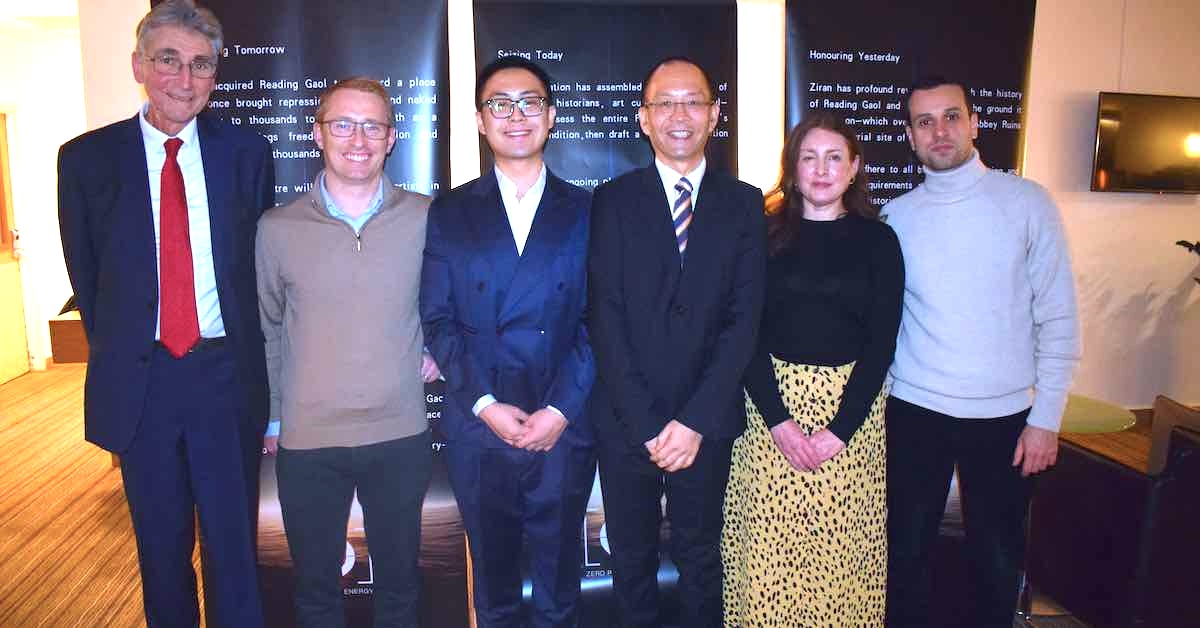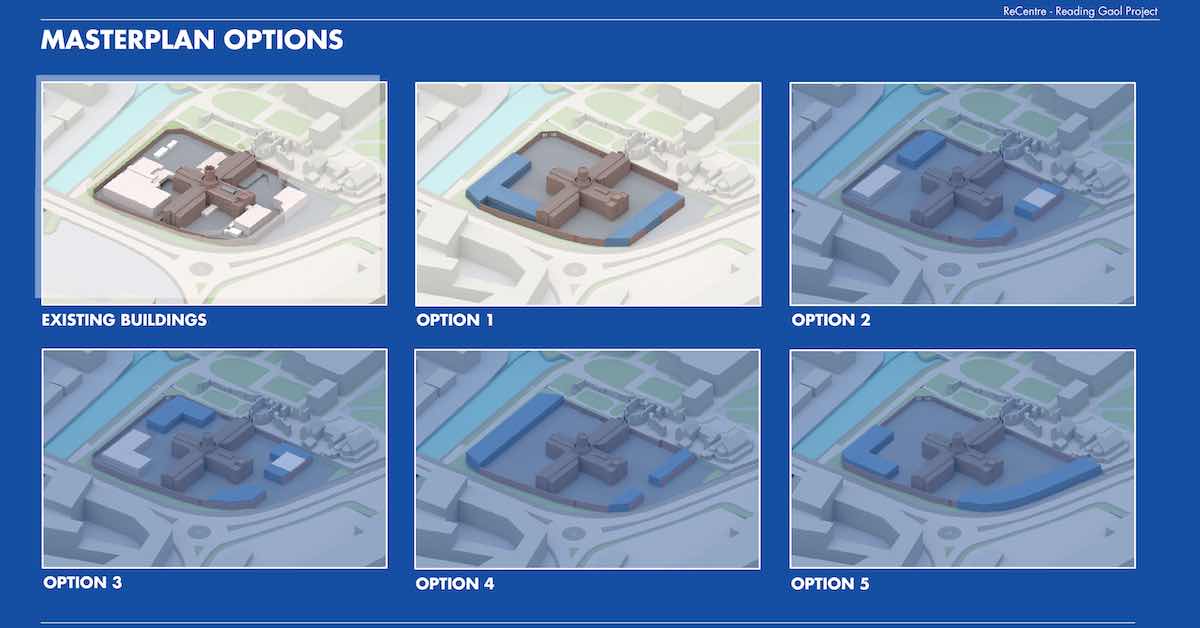A glimpse into the thinking to regenerate Reading Gaol was given to a host of community groups on Monday (November 25).
In a meeting chaired by former councillor Tony Page, who is overseeing public engagement, Ziran Foundation founder Channing Bi and his son Dylan, along with members of the project team, addressed a group of invited guests at the Novotel to outline the current thinking.
The ReCentre, as it will be known, is likely to accommodate a hotel across some of the upper floors and be a notable place for public art. Artists will be able to exhibit for free but will be invited to give a donation to the foundation’s students or another cause.
Dylan Bi told guests the new name represents transformation of the prison but also its positioning as a centre for ‘thought, art and the human spirit’.
He said it is to be a place for freedom, hope and will no longer be associated with imprisonment or the constraints associated with it.
Dylan Bi told the meeting: “We aspire the ReCentre to become the landmark centre for art, education and spiritual exploration, attracting visitors from across the globe to experience their creativity and humanity, which we want to share with everyone.”
The meeting heard different masterplan options are being considered.
Don Messenger of DP9, who is also working on Station Hill, said the permeability of the outer wall was being considered as well as connecting the prison to the River Kennet behind. There will be an active programme of events.
He said: “Our objective is to make sure there are things going on all the time so that there’s a purpose in going to this part of town throughout the year.”
Much of the upper floors are likely to be a hotel with bars, restaurants, community spaces below and performance areas.
The 1970s buildings around the main 1844 cruciform are likely to go and a number of options are being considered for buildings which could replace them (some are shown in the image below).
Mr Bi addressed the meeting with the help of son Dylan who translated some of his speech.
Dylan Bi told the meeting: “My father knows that worldwide, many people have money but, when they’re at a certain level, they start up a non-profit organisation but all the profit is still used for his or her private purposes.
“He is not going to do that. His will disclose everything as required by the UK law so that everyone will see how the money is used and where the money is used – and it is 100 per cent for educational purposes.”
Dylan Bi said the plan to give the space to Thames Valley Police for training was because the foundation discovered the police have a limited budget and may not be able to afford to rent it. TVP has since withdrawn its planning application to use the prison.
Dylan Bi continued: “The future of this project is a collective result of everyone here and some who have not had the chance to attend. So we wish to work with everyone closely and tightly to receive the advice that you have and will definitely discuss with an external agency to see if any improvements can be made.”
One feature, which he said is a world first, will be the opportunity for artists to exhibit for no charge, other than being invited to give a voluntary charity donation.
He said: “At the moment if you have a piece of artwork and you want to display it, you either go to a museum, gallery or, if you’re famous, you can put it in auction.
“Basically, there are limited approaches for you to display your artwork to the public but at the prison we will be open to accept artwork for free and we will display it for free and on any profit earned by the owner of that artwork, we won’t charge any percentage.
“A museum or gallery will charge around 30-40 per cent of any profit but we will charge absolutely zero. Instead we will recommend – and only recommend – the owner, when he or she gets the profit, to donate a certain percentage to students or anyone who needs it.
“We want to emphasise that, first of all, this project is a museum then a hotel, so profitability is not a major driver.”
Members of the project team could not give a timescale for development but said they hoped to submit a planning application next Autumn.
Image (top) shows (l-r): Tony Page, Don Messenger from DP9, Dylan Bi, Channing Bi, Katharine Barber from Purcell (heritage consultant) and Simone Scarano (lead architect, Novembre Studio, Milan).
Image (in text) shows the existing building and five possible options of layouts being considered around the main cruciform.
© Thames Tap (powered by ukpropertyforums.com).
Sign up to receive our weekly free journal, The Forum here.














How ironic that a group of “invited guests” should be lectured by a Chinese businessman on the creation of “a place for freedom, hope and will no longer be associated with imprisonment or the constraints associated with it”. Perhaps he’s forgetting that in the UK we have freedom and before the election of the latest government, had hope. I realise this latter emotion has taken a comprehensive battering in recent months but even then I think we’re in a better place that those being forced to work in the sweat shops or forced labour tomato fields of China. Wake up Britain – we’re being overrun and its not bringing the benefits we are erroneously told by the media, it will.
It’s taking an awful long time for details of plans to be revealed ! Do we have any reaction from the council ?
I’ve been following the plans for Reading Gaol closely, and while I’m encouraged by the idea of transformation, I have to say this: you cannot create a centre for creativity, freedom, and hope without including theatre at its heart. Reading is blessed with some of the most extraordinary theatre companies—RABBLE Theatre, Progress Theatre, and Reading Rep, to name just a few. These groups have been at the forefront of telling stories, challenging ideas, and fostering community for years. To overlook their role in this project would be a huge mistake. I am surprised Reading Borough Council have not challenged and fought for this.
Theatre is not just entertainment; it’s a space where people confront ideas, find connection, and celebrate the human spirit. If the ReCentre truly aims to honour creativity and freedom, how can it do so without including one of the most powerful forms of expression? Oscar Wilde, one of Reading Gaol’s most iconic figures, was not only a writer but also a playwright. His work continues to inspire dialogue and reflection. Ignoring the local theatre scene in this project would be like building a monument to creativity without including the very voices that bring it to life.
Of course, the vision outlined by the Ziran Foundation—art, education, and spiritual exploration—is promising. But this can’t just be a grand gesture. If you’re going to talk about freedom, hope, and humanity, it has to start with the people already working tirelessly to create these things in Reading. That means inviting local theatre companies, artists, and cultural organisations to shape this vision from the ground up. Why is this not happening?
Let’s not lose sight of what makes Reading special. RABBLE Theatre’s bold productions draw on our history and community, Progress Theatre brings classic and contemporary works to local audiences, and Reading Rep Theatre transforms lives through inclusive education and professional performances. These groups are already doing the work of creativity, freedom, and hope. They need to be at the table.
I understand the scepticism some people have about this project. Yes, we need transparency, inclusivity, and open dialogue, and the Ziran Foundation must commit to listening to the people of Reading—not just in one-off meetings but throughout this process. But this is also an opportunity. With the right approach, the ReCentre could be a shining example of how global collaboration can uplift local communities.
My plea is simple: make theatre and local arts a cornerstone of this transformation. Reading Gaol has always been a place of stories—some painful, some hopeful. Let’s make sure that tradition lives on, not just through exhibitions but through the voices and performances of the brilliant local talent we already have. Now that would be something worth celebrating.
And here’s the kicker: Reading has, time and again, sought city status. Yet it seems only those towns with a vibrant theatrical culture at their heart are awarded this honour—look no further than recent examples like Coventry, crowned City of Culture in 2021, or the theatres at the centre of culture in York and Chelmsford. Without theatre, Reading risks missing out on yet another chance to cement its status as a city of culture, creativity, and innovation.
If the ReCentre aims to embody hope and humanity, it must embrace the stage. Reading deserves no less.